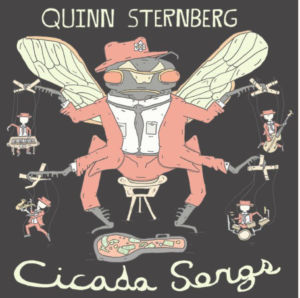 Not long after his sophomore effort, Mind Beach, jazz bassist Quinn Sternberg was composing material for his next release when inspiration hit. He noticed that insects chirped in a 7/4 time signature on a tropical night, counted as a pair of two-beat triplet phrases, followed by a three-beat phrase. By merging the sounds of nature and a combo emulating that symbiotically, that breakthrough led to writing the title track and the feeling the project was coming together. Admittedly, “Cicada Songs” was altered slightly to switch between 5/4 and 7/4 to not be so robotic. It starts with saxophonist Sam Taylor’s swinging attack over a core triplet pattern between Peter Varnado’s rapping beats.
Not long after his sophomore effort, Mind Beach, jazz bassist Quinn Sternberg was composing material for his next release when inspiration hit. He noticed that insects chirped in a 7/4 time signature on a tropical night, counted as a pair of two-beat triplet phrases, followed by a three-beat phrase. By merging the sounds of nature and a combo emulating that symbiotically, that breakthrough led to writing the title track and the feeling the project was coming together. Admittedly, “Cicada Songs” was altered slightly to switch between 5/4 and 7/4 to not be so robotic. It starts with saxophonist Sam Taylor’s swinging attack over a core triplet pattern between Peter Varnado’s rapping beats.
Sternberg likens “Alter Ego,” another rhythmically complex composition, to “code switching” (a speaker alternating in multiple languages). Through various movements, time signatures, and tonalities, the road traveled leads back to a C-flat major chord, essentially saying the same thing differently to different people.
Several compositions are interpretations of Sternberg’s own experiences, with “Insomnia” being a prime example. It starts with a beautiful, atmospheric melody representing a restive state, followed by a disruptive, conflict-torn passage characterizing the struggle to sleep. It then commences with alternating notes symbolizing a jarring alarm clock. The alarm clock movement builds with activity, meaning the failed sleeper has resigned to face the day.
“Remember the Birds” is based on a serene moment where a flock rises to take flight in the sky. Usually, Taylor’s the prominent voice with everyone else responding to his lead, but on “Remember the Birds,” pianist Oscar Rossignoli plays a significant role. On the intro, he plays the strings of an acoustic piano to sound like a stringed harp and takes a flighty solo later as the birds prepare to launch.
It’s an album of firsts for Sternberg, with more rhythmically complex compositions, and the first time he has recorded with electric bass, along with his usual acoustic bass, to match the ambiance of the tune on hand. As a bassist, he’s a stealth one, with an occasional noticeable presence.
Sternberg leverages a few trademarks as a composer, such as playing the melody in unison on “June,” where there is no featured soloist. Elsewhere, there’s still alternating, improvising soloists with everyone contributing to the melody.
Surprise, abrupt endings are another trademark, such as “What a Day” and “Porch Cat.” The last note isn’t played since the pattern has been repeated a few times. By then, the listener should know the melody well enough to anticipate it. Deep stuff indeed, but what else would you expect when inspiration comes from the rhythms of insects?




